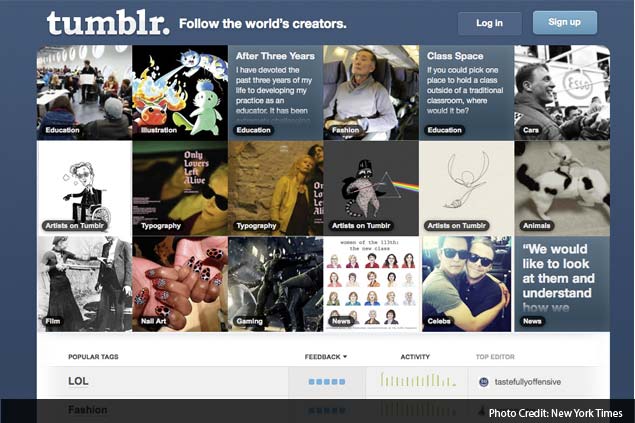- Home
- Internet
- Internet News
- A flashy bet for Yahoo on a shift in social media
A flashy bet for Yahoo on a shift in social media
By Jenna Wortham, The New York Times | Updated: 23 May 2013 13:59 IST

Click Here to Add Gadgets360 As A Trusted Source

Advertisement
Yahoo's $1.1 billion-proposed acquisition of Tumblr is a huge coup for the young founder of the even younger startup and a splashy move by Marissa Mayer to shake up her company.
It also heralds a larger shift in social media. Facebook arguably invented modern social networking, and is still the king. But increasingly its approach is seen as passive and outdated as people flock to sites like Tumblr where they can be more actively engaged in creating personal, expressive content to share - and which could potentially translate to advertising dollars.
"People love a stage or a pulpit from which they can broadcast," S. Shyam Sundar, a director of the Media Effects Research Laboratory at Pennsylvania State University, explained. "The genie is out of the bottle. Everyone loves it and it's very seductive for users to get online and be a source of content, rather than just consuming passively."
This is behind the appeal of sites like Tumblr, where millions have created signature blogs; or Reddit, the news aggregator, which is encouraging users to make and upload video content to share; or video sites like YouTube. Also, Vine, a Twitter app that allows people to easily make and post six-second videos has been wildly popular since its debut in January. One of Vine's creators, Dom Hofmann, said the its initial success was "rooted in the simplicity of the tool."
Snapchat, the messaging application, which lets people add text or draw cartoons on top of photos and videos, is processing upward of 150 million images each day. And Instagram, which Facebook acquired last year, has attracted more than 100 million users in its short life span - letting people add vintage effects and other filters to their photos.
The more services like Vine and Tumblr can "come up with ways to let people control and generate content and project identity," Sundar predicted, the more successful they will be.
Still, these newer sites have not yet proved they are moneymakers, which makes Yahoo's move a big bet. And as much as Tumblr's sale can be seen as a success story for the small company, it also hints at the darker struggles of a social media service that is rich in users and nothing else.
Plus, Facebook is still a force to be reckoned with. The company has a billion-plus users and generated $5 billion in revenue last year. But except for the Instagram acquisition, Facebook has been slow to introduce tools to let members make and create interesting content beyond uploading photos and videos.
The result is that it has evolved more into a social directory, a kind of yellow pages of the Internet, where people spend time tending to their public image and endlessly tweaking security settings to keep their party pictures private. And signs have begun to emerge suggesting that users are becoming bored and disenchanted with the site.
A recent report by Piper Jaffray that surveyed 5,200 American teenagers on their online use found that while Facebook is still the most important media destination for teenagers, its popularity slipped 9 percent from spring 2012.
Gene Munster, one of the lead analysts on the survey, said that if anything, the results show that the taste and interest of Web users, particularly younger ones, is fickle and fleeting.
"It's not a question of whether or not Facebook will stay relevant," Munster said. "On the margin, they will still be relevant. It's about the potential for declining engagement and what that impact is over the longer-term for making money."
People have so many news feeds, sites, apps and in-boxes competing for their time, said Kim Celestre, an analyst with Forrester Research, that the sites and services where they are active participants are more likely to hold their attention for longer, attracting advertising dollars. Tumblr says its members spend 24 billion minutes on the site each month.
"Big marketing campaigns are looking to bring people into their brand and immerse them," she said.
Tumblr, though, has not made much money. It made its priority the sale of premium products, like designer "themes" or formats for blogs, and sponsored content over advertising, neither of which were enough to push it into a net profit. The same appears to be true for a few similarly popular social networking services, like Path, Foursquare and Quora.
It is not clear how any of these sites will make money - unless perhaps they are also purchased by a giant company hoping to revitalize its image and curry favor with a hipper audience of Internet users.
The new social sites have all sorts of different ways of content creation. On Tumblr, users can easily and quickly create a diary or journal of images, GIFs, links and ideas. They can even change their user names each day to evade nosy parents and teachers - something that is impossible on Facebook and becoming more difficult on Twitter and even Instagram.
Some older sites are also joining the creation bandwagon. LinkedIn, the business social network, has begun to encourage its users to contribute blog posts. Gawker is rolling out a comment system, Kinja, that lets readers create and moderate their own conversations and reactions to posts and articles.
BuzzFeed, the hip young news site, is also encouraging its readers to submit their own posts to the site, and make and upload their own GIFs to the service.
People like Kyle Williams, a 32-year-old designer who lives in Manhattan, have found themselves drifting away from Facebook in favor of creative tools that encourage them to make things, rather than share every bit of minute detail about their lives.
"Facebook is dying in my social media calendar," he said. "I hardly tap into that anymore. It's just so expected and just what my friends are doing. There's something about the creativity of strangers on these other platforms that seems more interesting and creative, even more than the people I know in real life."
Williams said he prefers Vine, Twitter's new video tool, over all other social media services, even Instagram.
David Karp, the 26-year-old founder of Tumblr, said in an interview that he did not view his microblogging service as a social networking service. "It's so not my domain," he said. Instead, he said he views it as a creative technology, like Adobe, which makes Photoshop, among other things, or like Dell or Apple. Each time the company has added a creative functionality, like the ability to upload GIFs or panoramic photos, usage has exploded, he said.
"There is an obsession with social right now," he said. "But most of the media we enjoy is increasingly fueled by an army of independent creators."
The 300 million people who visit the site each month come "not because their friends are here," Karp said. "It's because the content they want to consume and make is here."
© 2013, The New York Times News Service
It also heralds a larger shift in social media. Facebook arguably invented modern social networking, and is still the king. But increasingly its approach is seen as passive and outdated as people flock to sites like Tumblr where they can be more actively engaged in creating personal, expressive content to share - and which could potentially translate to advertising dollars.
"People love a stage or a pulpit from which they can broadcast," S. Shyam Sundar, a director of the Media Effects Research Laboratory at Pennsylvania State University, explained. "The genie is out of the bottle. Everyone loves it and it's very seductive for users to get online and be a source of content, rather than just consuming passively."
This is behind the appeal of sites like Tumblr, where millions have created signature blogs; or Reddit, the news aggregator, which is encouraging users to make and upload video content to share; or video sites like YouTube. Also, Vine, a Twitter app that allows people to easily make and post six-second videos has been wildly popular since its debut in January. One of Vine's creators, Dom Hofmann, said the its initial success was "rooted in the simplicity of the tool."
Snapchat, the messaging application, which lets people add text or draw cartoons on top of photos and videos, is processing upward of 150 million images each day. And Instagram, which Facebook acquired last year, has attracted more than 100 million users in its short life span - letting people add vintage effects and other filters to their photos.
The more services like Vine and Tumblr can "come up with ways to let people control and generate content and project identity," Sundar predicted, the more successful they will be.
Still, these newer sites have not yet proved they are moneymakers, which makes Yahoo's move a big bet. And as much as Tumblr's sale can be seen as a success story for the small company, it also hints at the darker struggles of a social media service that is rich in users and nothing else.
Plus, Facebook is still a force to be reckoned with. The company has a billion-plus users and generated $5 billion in revenue last year. But except for the Instagram acquisition, Facebook has been slow to introduce tools to let members make and create interesting content beyond uploading photos and videos.
The result is that it has evolved more into a social directory, a kind of yellow pages of the Internet, where people spend time tending to their public image and endlessly tweaking security settings to keep their party pictures private. And signs have begun to emerge suggesting that users are becoming bored and disenchanted with the site.
A recent report by Piper Jaffray that surveyed 5,200 American teenagers on their online use found that while Facebook is still the most important media destination for teenagers, its popularity slipped 9 percent from spring 2012.
Gene Munster, one of the lead analysts on the survey, said that if anything, the results show that the taste and interest of Web users, particularly younger ones, is fickle and fleeting.
"It's not a question of whether or not Facebook will stay relevant," Munster said. "On the margin, they will still be relevant. It's about the potential for declining engagement and what that impact is over the longer-term for making money."
People have so many news feeds, sites, apps and in-boxes competing for their time, said Kim Celestre, an analyst with Forrester Research, that the sites and services where they are active participants are more likely to hold their attention for longer, attracting advertising dollars. Tumblr says its members spend 24 billion minutes on the site each month.
"Big marketing campaigns are looking to bring people into their brand and immerse them," she said.
Tumblr, though, has not made much money. It made its priority the sale of premium products, like designer "themes" or formats for blogs, and sponsored content over advertising, neither of which were enough to push it into a net profit. The same appears to be true for a few similarly popular social networking services, like Path, Foursquare and Quora.
It is not clear how any of these sites will make money - unless perhaps they are also purchased by a giant company hoping to revitalize its image and curry favor with a hipper audience of Internet users.
The new social sites have all sorts of different ways of content creation. On Tumblr, users can easily and quickly create a diary or journal of images, GIFs, links and ideas. They can even change their user names each day to evade nosy parents and teachers - something that is impossible on Facebook and becoming more difficult on Twitter and even Instagram.
Some older sites are also joining the creation bandwagon. LinkedIn, the business social network, has begun to encourage its users to contribute blog posts. Gawker is rolling out a comment system, Kinja, that lets readers create and moderate their own conversations and reactions to posts and articles.
BuzzFeed, the hip young news site, is also encouraging its readers to submit their own posts to the site, and make and upload their own GIFs to the service.
People like Kyle Williams, a 32-year-old designer who lives in Manhattan, have found themselves drifting away from Facebook in favor of creative tools that encourage them to make things, rather than share every bit of minute detail about their lives.
"Facebook is dying in my social media calendar," he said. "I hardly tap into that anymore. It's just so expected and just what my friends are doing. There's something about the creativity of strangers on these other platforms that seems more interesting and creative, even more than the people I know in real life."
Williams said he prefers Vine, Twitter's new video tool, over all other social media services, even Instagram.
David Karp, the 26-year-old founder of Tumblr, said in an interview that he did not view his microblogging service as a social networking service. "It's so not my domain," he said. Instead, he said he views it as a creative technology, like Adobe, which makes Photoshop, among other things, or like Dell or Apple. Each time the company has added a creative functionality, like the ability to upload GIFs or panoramic photos, usage has exploded, he said.
"There is an obsession with social right now," he said. "But most of the media we enjoy is increasingly fueled by an army of independent creators."
The 300 million people who visit the site each month come "not because their friends are here," Karp said. "It's because the content they want to consume and make is here."
© 2013, The New York Times News Service
Comments
Catch the latest from the Consumer Electronics Show on Gadgets 360, at our CES 2026 hub.
Related Stories
Popular on Gadgets
- Samsung Galaxy Unpacked 2025
- ChatGPT
- Redmi Note 14 Pro+
- iPhone 16
- Apple Vision Pro
- Oneplus 12
- OnePlus Nord CE 3 Lite 5G
- iPhone 13
- Xiaomi 14 Pro
- Oppo Find N3
- Tecno Spark Go (2023)
- Realme V30
- Best Phones Under 25000
- Samsung Galaxy S24 Series
- Cryptocurrency
- iQoo 12
- Samsung Galaxy S24 Ultra
- Giottus
- Samsung Galaxy Z Flip 5
- Apple 'Scary Fast'
- Housefull 5
- GoPro Hero 12 Black Review
- Invincible Season 2
- JioGlass
- HD Ready TV
- Laptop Under 50000
- Smartwatch Under 10000
- Latest Mobile Phones
- Compare Phones
Latest Gadgets
- Tecno Spark Go 3
- iQOO Z11 Turbo
- OPPO A6c
- Samsung Galaxy A07 5G
- Vivo Y500i
- OnePlus Turbo 6V
- OnePlus Turbo 6
- Itel Zeno 20 Max
- Lenovo Yoga Slim 7x (2025)
- Lenovo Yoga Slim 7a
- Lenovo Idea Tab Plus
- Realme Pad 3
- Garmin Quatix 8 Pro
- NoiseFit Pro 6R
- Haier H5E Series
- Acerpure Nitro Z Series 100-inch QLED TV
- Asus ROG Ally
- Nintendo Switch Lite
- Haier 1.6 Ton 5 Star Inverter Split AC (HSU19G-MZAID5BN-INV)
- Haier 1.6 Ton 5 Star Inverter Split AC (HSU19G-MZAIM5BN-INV)
© Copyright Red Pixels Ventures Limited 2026. All rights reserved.







![[Sponsored] Haier C90 OLED TV | Dolby Vision IQ, 144Hz OLED and Google TV in Action](https://www.gadgets360.com/static/mobile/images/spacer.png)









